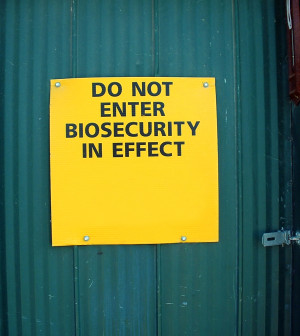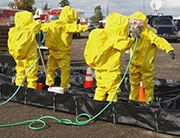- Could Your Grocery Store Meat Be Causing Recurring UTIs?
- Are You Making This Expensive Thermostat Error This Winter?
- Recognizing the Signs of Hypothyroidism
- 10 Strategies to Overcome Insomnia
- Could Artificial Sweeteners Be Aging the Brain Faster?
- Techniques for Soothing Your Nervous System
- Does the Water in Your House Smell Funny? Here’s Why
- Can a Daily Dose of Apple Cider Vinegar Actually Aid Weight Loss?
- 6 Health Beverages That Can Actually Spike Your Blood Sugar
- Treatment Options for Social Anxiety Disorder
Ebola Vaccine Trials Set to Begin in September


Officials at the World Health Organization said that the first round of clinical trials of a potential Ebola vaccine made by drug maker GlaxoSmithKline could begin next month.
A vaccine resulting from the trials could possibly be available by 2015, MSN News reported Sunday.
Late last week, WHO declared the outbreak of deadly Ebola virus in West Africa a “public health emergency.”
The outbreak, which has already claimed 961 lives in Guinea, Liberia, Nigeria and Sierra Leone, “constitutes an ‘extraordinary event’ and a public health risk to other States,” WHO said in a statement. The declaration was based on the unanimous decision of an emergency committee meeting convened last week.
“A coordinated international response is deemed essential to stop and reverse the international spread of Ebola,” the health organization said. Experts pointed to several ominous factors, such as the emergence of cases of Ebola in densely populated cities; cases arising among health-care workers that suggest “inadequate infection control practices”; and generally “fragile” health-care systems.
WHO recommended that each of the countries affected by the outbreak declare a national emergency, clearly inform the public of the situation and ramp up efforts to limit transmission of the virus.
Meanwhile, medical ethicists will meet this week to discuss who should have access to the limited supplies of an experimental medicine for the deadly Ebola virus, WHO said.
The drug was given to and benefited Dr. Kent Brantly and Nancy Writebol, two American aid workers who contracted the disease in West Africa. It was the first time the drug was tried on people, NBC News reported. Writebol’s husband has returned to the United States with two other missionaries who are not showing signs of the disease, although all three will be quarantined, according to the the news network.
The maker of the drug has said it can’t produce large amounts of the experimental medicine, which means only a limited number of patients would be able to receive it. There is no certified vaccine or cure for Ebola.
“We are in an unusual situation in this outbreak,” WHO official Dr. Marie-Paule Kieny said in a statement, NBC reported. “We need to ask the medical ethicists to give us guidance on what the responsible thing to do is.”
In a potentially key development, researchers suspect that “Patient Zero” — the source of the outbreak — was a 2-year-old boy who died in early December in southeastern Guinea. He died in a village that borders Sierra Leone and Liberia, giving the Ebola virus a foothold in the three West African nations, according to published reports.
A week after the boy’s death, the virus killed his mother, then his 3-year-old sister and then his grandmother. All experienced fever, vomiting and diarrhea, but no one knew at the time what had sickened them, The New York Times reported.
Several people who attended the grandmother’s funeral then took the virus to their own village. A health worker transmitted it to another village, where he died, as did his doctor. Both the health worker and his doctor infected relatives from other towns, and from there the virus spread rapidly, the Times said, citing a report in The New England Journal of Medicine.
The new outbreak raises the question — why did the deadly virus spread so far and so quickly when past Ebola outbreaks have been contained, typically within months. The answer, according to the Times report: past outbreaks usually occurred in remote locales. But the current outbreak started in a border region for three countries where there are good roads, making travel — and transmission of the virus — much easier than in the past.
On Friday evening, Nigerian President Goodluck Jonathan declared “a national emergency” and approved more than $11 million in government funding to fight the spread of Ebola, according to BBC News.
Last week, the U.S. Centers for Disease Control and Prevention raised its response to the Ebola outbreak to its highest alert status. The move allows the CDC to expand its role in fighting the growing public health crisis, which gained new urgency as cases of the deadly infection began to be reported in populous Nigeria.
According to NBC News, a “level 1 activation” response by the CDC has typically been reserved for only the most dire and pressing emergencies, such as the aftermath of Hurricane Katrina in 2005 or the bird flu outbreak in 2009. The CDC has already committed 50 more staff people to fly to the area of the outbreak over the next month, and more could follow.
More information
Visit the CDC for more on Ebola.
Source: HealthDay
Copyright © 2026 HealthDay. All rights reserved.










